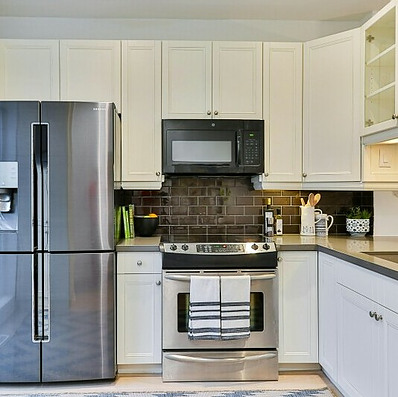 How to Properly Clean and Maintain Your Kitchen Appliances
How to Properly Clean and Maintain Your Kitchen Appliances
Cleaning and maintaining your kitchen appliances is important to keep them functioning well and to prevent any health hazards. Here are some general tips for different types of appliances:
- Refrigerator: Clean the inside with a mixture of water and vinegar and wipe the door gasket and shelves. Remove any expired or spoiled food items regularly. Vacuum the coils at the back or bottom of the fridge every few months to improve efficiency1.
- Dishwasher: Run a cycle with vinegar in a dishwasher-safe cup on the top rack to sanitize and remove soap scum. Clean the door, filter, and spray arm with a soft brush and mild detergent. Use lemon juice instead of vinegar to remove hard water deposits1.
- Oven: Use the self-cleaning option if available or make a paste of baking soda and water and spread it inside the oven. Let it sit for at least 20 minutes, then spray with vinegar and wipe off. Clean the glass door separately with a non-abrasive cleaner2.
- Stove: Wipe the surface with a damp cloth and a non-abrasive cleaner after each use. For electric stoves, remove the burners and coils and clean them carefully. For gas stoves, remove the grates and soak them in hot water and dish soap. For glass stoves, use a special cleaner and a scraper to remove any spills2.
- Microwave: Heat a bowl of water in the microwave until it boils, then let it sit for a few minutes. This will loosen any food particles and stains. Wipe the inside with a damp cloth and a mild detergent. Clean the turntable separately with warm water and soap2.
For more specific tips and instructions, you can check out these websites:
- The Best Methods to Cleaning Appliances, Step by Step
- How to Clean Kitchen Appliances the Right Way
- Kitchen Equipment Maintenance: Everything You Need to Know
- 47 Insanely Handy Kitchen Appliance Care Tips
- How to Properly Clean and Maintain Kitchen Appliances..
Natural and safe cleaning agents you can use.
 There are many natural and safe cleaning agents that you can use on all appliances, such as:
There are many natural and safe cleaning agents that you can use on all appliances, such as:
- Vinegar: Vinegar is a versatile cleaner that can remove stains, disinfect, and deodorize. You can mix it with water and use it to clean your refrigerator, dishwasher, oven, stove, microwave, and windows12.
- Baking soda: Baking soda is a mild abrasive that can help scrub away dirt and grime. You can make a paste of baking soda and water and use it to clean your oven, stove, and sink12.
- Lemon juice: Lemon juice is a natural bleaching agent that can help brighten and freshen your appliances. You can use it to clean your dishwasher, oven, stove, and microwave13.
- Castile soap: Castile soap is a gentle and biodegradable soap that can cut through grease and oil. You can use it to clean your dishwasher, stove, and dishes32.
- Essential oils: Essential oils are aromatic oils that can add a pleasant scent and some antibacterial properties to your cleaning solutions. You can use oils like lavender, lemon, orange, peppermint, tea tree, and eucalyptus to enhance your vinegar, baking soda, or castile soap mixtures3.
To make your own natural and safe cleaning solutions, you can follow these simple recipes:
- All-purpose cleaner: Mix 3/4 cup of water, 1/4 cup of rubbing alcohol, 5 to 10 drops of your favorite essential oil, and a squirt of natural dish soap in a spray bottle. Shake well and use it to clean most surfaces except for glass1.
- Degreaser: Mix 2 cups of water, 2 tablespoons of freshly squeezed lemon juice, 1/2 teaspoon of castile soap, and 1 tablespoon of baking soda in a spray bottle. Shake well and use it to clean greasy surfaces1.
- Glass cleaner: Mix 1/4 cup of vinegar, 2 cups of water, and a few drops of lemon or orange essential oil in a spray bottle. Shake well and use it to clean windows and mirrors1.
The dos and don’ts of appliance cleaning to prevent damage
Appliance cleaning is an important task to keep your kitchen appliances in good condition and prevent damage. However, not all cleaning methods are suitable for different types of appliances. Here are some dos and don’ts of appliance cleaning to prevent damage:
- Do read the user manual before cleaning any appliance. The manual may have specific instructions or recommendations for the best cleaning products and techniques for your appliance1.
- Do use natural and safe cleaning solutions, such as vinegar, baking soda, lemon juice, castile soap, and essential oils. These products can effectively remove stains, grease, and odors without harming your appliance’s finish2.
- Do follow a systematic approach when cleaning your appliance. Start by unplugging the appliance or turning off the gas supply, and then remove any removable parts. Clean the appliance from top to bottom, inside and out, and then reassemble the parts. Wipe the appliance with a dry cloth to remove any moisture12.
- Don’t use abrasive cleaners and products, such as steel wool, scouring pads, bleach, or ammonia. These products can scratch, corrode, or discolor your appliance’s surface and cause permanent damage2345.
- Don’t neglect safety precautions when cleaning your appliance. Wear gloves and eye protection, and avoid contact with hot or sharp parts. Keep children and pets away from the appliance while cleaning. Dispose of any used cleaning products properly13.
- Don’t attempt to repair or service your appliance yourself if you are not confident or qualified. Some appliance issues may require professional help, especially if they involve electrical or gas components. Trying to fix your appliance yourself may result in more damage, injury, or fire hazards13.
Maintaining Small Appliances for Everyday Excellence
Maintaining small appliances for everyday excellence is a great way to ensure that your kitchen gadgets are always ready to use and perform well. Here are some general tips for maintaining small appliances:
- Clean them regularly: Cleaning your small appliances after each use or at least once a week can prevent dirt, grease, and food residue from building up and affecting their functionality. You can use natural and safe cleaning agents, such as vinegar, baking soda, lemon juice, castile soap, and essential oils, to clean most appliances12. For specific cleaning instructions, refer to the user manual or the manufacturer’s website.
- Store them properly: Storing your small appliances in a safe and convenient place can protect them from damage and make them easy to access. You can use your cabinets, shelves, drawers, or pantry to store your appliances, depending on their size, weight, and frequency of use. You can also use organizers, such as baskets, bins, racks, or hooks, to keep them neat and tidy34. Make sure to unplug them and wrap their cords before storing them.
- Check them periodically: Checking your small appliances for any signs of wear and tear, such as cracks, leaks, rust, or loose parts, can help you identify and fix any potential problems before they worsen. You can also test their performance and functionality by running them on a low setting or using a multimeter to measure their electrical resistance. If you notice any issues, contact the manufacturer or a qualified technician for repair or replacement.
By following these tips, you can maintain your small appliances for everyday excellence and enjoy their benefits for a long time.
Click this link to Amazon to take a look at organizers. https://kitchen-gadgets.org/space-saving-kitchen-organizers/
Kathie